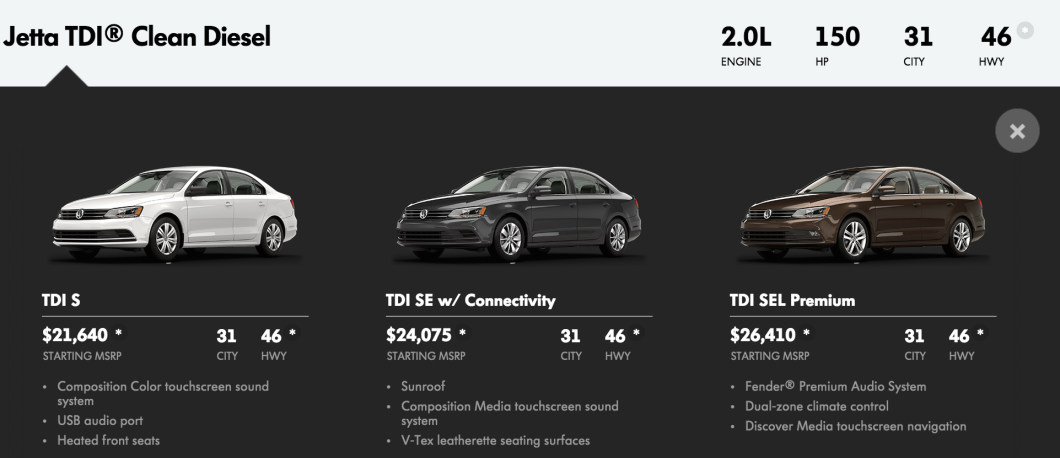Volkswagen’s U.S. Chief To Be Grilled On Capitol Hill Tomorrow
 Several weeks after Volkswagen admitted that millions of its so-called “clean diesel” vehicles were secretly set up to cheat on emissions tests, U.S. lawmakers are getting their first chance to directly question the carmaker about the scandal.
Several weeks after Volkswagen admitted that millions of its so-called “clean diesel” vehicles were secretly set up to cheat on emissions tests, U.S. lawmakers are getting their first chance to directly question the carmaker about the scandal.
Tomorrow morning, the Oversight & Investigations Subcommittee of the House Energy & Commerce Committee will hold a hearing centered the deceptive VW emissions systems. While two high-ranking officials from the Environmental Protection Agency will testify, the real centerpiece of the hearing is expected to be Michael Horn, President and CEO of Volkswagen’s U.S. operations.
It was Horn who, days after news of the carmaker’s trickery broke, was tasked with admitting the company’s culpability.
“We’ve totally screwed up,” he explained at the time, while also confessing to the public that Volkswagen had been “dishonest with the EPA, and the California Air Resources Board, and with all of you.”
And in his prepared opening remarks before the Congressional subcommittee, Horn remains the contrite face of VW.
“These events are deeply troubling,” says Horn. “I did not think that something like this was possible at the Volkswagen Group. We have broken the trust of our customers, dealerships, and employees, as well as the public and regulators.”
He explains that he first learned of discrepancies between emissions test results and actual emissions of VW’s diesel vehicles in the spring of 2014. That’s when researchers at West Virginia University published the results of their research that would ultimately lead to the current situation.
He says he knew of the potential for significant penalties for failing to comply with emissions standards but believed that VW engineers were working to resolve the issue.
“Later in 2014, I was informed that the technical teams had a specific plan for remedies to bring the vehicles into compliance and that they were engaged with the agencies about the process,” explains Horn.
But it wasn’t until Sept. 3, 2015, that VW came clean with the EPA and CARB about the use of hidden “defeat device” software that only turns on a vehicle’s full emissions control system when the car is undergoing an emissions test.
Horn’s prepared remarks reveal another possible hiccup in the road toward rehabbing the company’s reputation and may delay the release of model year 2016 Volkswagens.
“In Volkswagen’s recent ongoing discussions with the regulators, we described to the EPA and CARB that our emissions control strategy also included a software feature that should be disclosed to and approved by them as an auxiliary emissions control device (“AECD”) in connection with the certification process,” he explains. “As a result, we have withdrawn the application for certification of our model year 2016 vehicles.”
While Horn is quick to acknowledge that VW failed miserably in this instance, he is quick to repeat the company line that affected VWs are safe to drive. This may be a response to recent reports that estimate the additional toxins released by these cars could have killed anywhere from five to 20 Americans a year.
Expect subcommittee members to ask Horn when exactly did top VW execs learn of the defeat devices. There will inevitably be questions about who made the decision to use this cheating software along with discussion of how those people should be held accountable.
Lawmakers may also ask why Volkswagen is so ill-prepared to remedy the situation. If the company learned of the problem in the spring of 2014, why must owners wait until at least January 2016 to get a repair — and what impact will those repairs have on the fuel efficiency of the cars.
After all, many people who purchased the “clean diesel” cars did so because they provided the efficiency of a diesel engine but without all the toxic emissions historically associated with diesel. If the fix only results in a vehicle that passes emissions tests but has subpar mileage, should VW do something to make those car owners whole?
Unfortunately, Horn will probably do a lot of bobbing and weaving on these tougher questions.
“We have not had the opportunity to review all aspects of this matter, indeed the investigation is just beginning,” he cautions in his opening remarks. “Therefore, my testimony and my answers to your questions will, by necessity, have to be considered preliminary and based on my best current recollection and information.”
Want more consumer news? Visit our parent organization, Consumer Reports, for the latest on scams, recalls, and other consumer issues.

